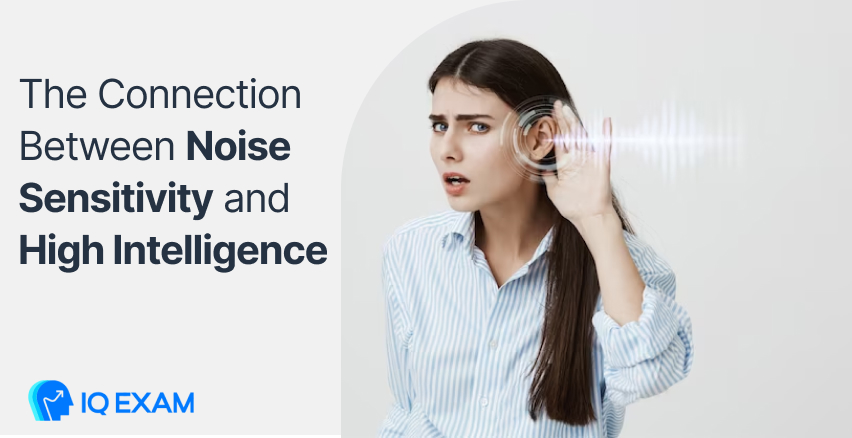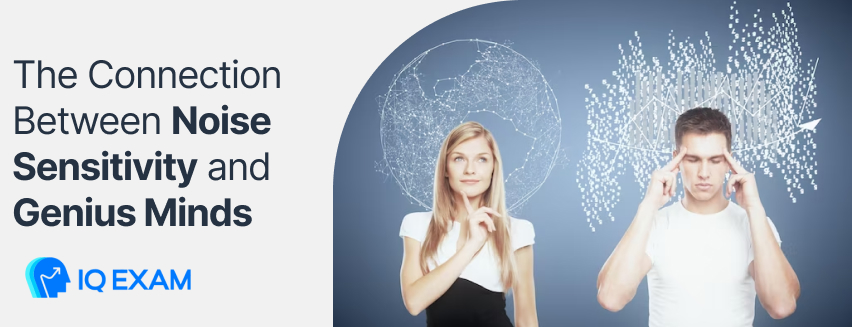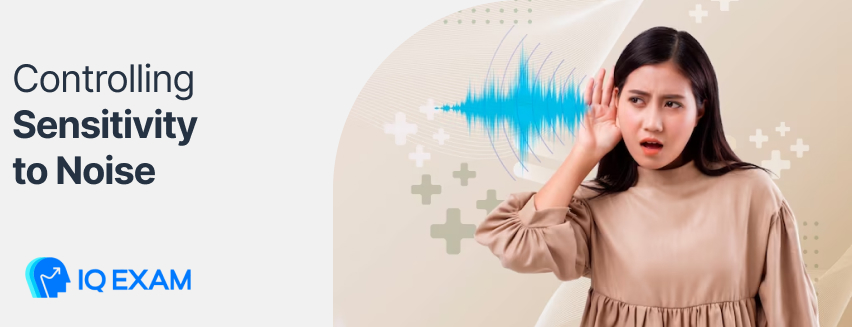
Do you ever find yourself feeling bothered by low humming or buzzing sounds? Believe it or not, your sensitivity to noise could indicate high intelligence. Let’s look closer at the link between noise sensitivity and intelligence.
What is Noise Sensitivity, and What Are Its Characteristics?
Hyperacusis, or noise sensitivity, is when individuals experience heightened reactions to everyday sounds. Normal sounds can become overwhelmingly intense for those suffering from this condition, and voices others might ignore can irritate them.
Diagnosing Hyperacusis
Those with hyperacusis perceive everyday sounds as much louder, which can cause discomfort or distress. In severe cases, it can even lead to pain. Unfortunately, there is no medical test to diagnose this condition. However, it is manageable and treatable to some extent, though there is no proven clinical cure.
Signs and Traits of Noise Sensitivity
Noise sensitivity isn’t just about volume. You’re considered “sensitive to noise” if you have any of these signs:
· Feeling discomfort at what most consider “normal” noise levels
· Difficulty concentrating due to background noise
· Physical symptoms like headaches or anxiety induced by certain sounds
· Getting annoyed by your voice
· You get stressed and overly annoyed by sudden loud noises
Linking Noise Sensitivity with Other Sensitivities
Are you sensitive to light, texture, and sound altogether? Don’t worry; it’s natural! Noise sensitivity often doesn’t come alone. It’s often linked with other sensory sensitivities, such as sensitivity to light, tactile textures, or certain smells.
This suite of sensitivities, when occurring together, often points to a larger pattern of heightened sensory perception.
Does this mean you’re more of a genius? Well, maybe!
The Genius Behind Noise Sensitivity
So, what’s the relationship between noise sensitivity and being a genius? Let’s take a closer look!
The Connection Between Noise Sensitivity and Genius Minds

It makes sense if you wonder, “What does noise sensitivity have to do with intelligence?” Researchers have found fascinating correlations.
Individuals with heightened sensitivity to sound often exhibit more excellent cognitive abilities, particularly problem-solving, creativity, and intuition.
Studies Supporting the Noise Sensitivity-Genius Correlation
The link between sensitivity to noise and being intelligent is studied academically. For instance, research has shown that people more sensitive to noise often perform better in complex cognitive tasks, suggesting a link between auditory sensitivity and mental acuity.
Case Studies of Notable Figures with Noise Sensitivity
History has seen renowned geniuses, such as Ludwig van Beethoven and Nikola Tesla, known to exhibit heightened sensitivity to sound. This sensitivity, far from being a hindrance, might have spurred their extraordinary achievements.
How Noise Sensitivity Contributes to a Broadened World View
What if being sensitive to noise was not a drawback but a unique asset? Individuals with noise sensitivity often have a unique way of interpreting the world around them.
Their heightened auditory perception may make them pay more attention to details others may overlook.
This attentiveness can lead to a broader and enhanced understanding of the world.
The Role of Noise Sensitivity in Enhancing Creativity
It’s interesting to know that sensitivity to noise often enhances creativity. Those with heightened senses may perceive and process their surroundings more intensely and complexly.
This can spark novel thoughts and ideas, fueling creative exploration and innovation. Their experience with sensory overload can lead to a deep, rich inner world, often a wellspring of creativity.
Noise Sensitivity and Cognitive abilities
A heightened sense of hearing often enhances their cognitive abilities, leading to remarkable accomplishments.
Controlling Sensitivity to Noise

Being overly sensitive to noise comes with its own set of challenges. Even if you’re a gifted adult dealing with this, it can make your life very hard. That’s why learning strategies to manage noise overload is important. Here are some techniques:
Sound Therapy
This technique involves using specific sounds to help desensitize the auditory system and reduce sensitivity to everyday sounds. This technique may include white noise, pink noise, or other soothing sounds. The goal is to increase tolerance to sound and improve overall comfort levels gradually.
Cognitive-Behavioral Therapy
CBT is a psychological approach that identifies and changes negative thought patterns and behaviors. In hyperacusis, CBT can help individuals develop coping strategies, manage anxiety or distress related to sound sensitivity, and reframe their perception of sound.
Tinnitus Retraining Therapy
TRT combines sound therapy and counseling techniques to help individuals with hyperacusis retrain their perception of sound. It aims to reduce the negative emotional response to sound and promote habituation by using low-level broadband noise generators.
Medications
Certain medications may be prescribed to manage the symptoms of hyperacusis. These can include antidepressants, anti-anxiety medications, or medications that target the central nervous system to regulate the auditory system’s response to sound.
Environmental Modifications
Making environmental changes can help reduce sound exposure and improve comfort for individuals with hyperacusis. This may involve using earplugs or earmuffs, creating a quieter living or working space, or implementing sound-absorbing materials.
Frequently Asked Questions

Are high-IQ individuals more prone to misophonia?
The link between a strong aversion to specific sounds and high IQ is still unclear. While some people with a high IQ may experience misophonia, insufficient scientific evidence supports this claim.
What personality traits are associated with noise sensitivity?
People sensitive to noise often exhibit introversion, neuroticism, and heightened sensitivity to sensory stimuli.
What causes noise sensitivity in some individuals?
Several factors can affect noise sensitivity, including genetic predisposition, environmental factors, past experiences, and individual sensory processing differences.
Do intelligent people tend to be noise-sensitive?
Although intelligence does not directly determine noise sensitivity, some brilliant individuals may have heightened awareness and attention to stimuli, leading to noise sensitivity.
Can noise sensitivity indicate ADHD?
Yes, noise sensitivity can be a characteristic of ADHD. However, not all individuals with ADHD will necessarily experience noise sensitivity.
What could be causing my heightened sensitivity to noise?
Heightened sensitivity to noise could be due to sensory processing differences, anxiety, stress, past traumatic experiences, hyperacusis, or certain neurological conditions.
Is noise sensitivity linked to any mental health conditions?
Noise sensitivity can be a symptom of mental health conditions such as anxiety disorders, PTSD, OCD, or autism spectrum disorders. It is crucial to seek a professional evaluation for an accurate diagnosis.
Can noise sensitivity be managed or reduced?
Yes, noise sensitivity can be managed and reduced through various strategies, such as creating a quiet environment, using earplugs or noise-canceling headphones, practicing relaxation techniques, engaging in stress-reducing activities, and seeking cognitive-behavioral therapy (CBT).
In Conclusion
Sensitivity to noise is more than just an annoyance; it can also be a sign of intelligence. This trait has been associated with gifted adults and historical figures of genius, as it allows for a deeper understanding of our surroundings and promotes creativity and innovation.
However, it’s important to recognize that noise sensitivity comes with its own challenges. However, these challenges can be overcome with the proper understanding and coping strategies. So, if you experience noise sensitivity, know you’re not alone. Embrace this unique trait, as it may just be your superpower.
